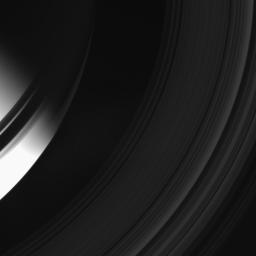
|
Splinter of Light
- Click the image above for a larger view
- Full-Res JPEG (1020 x 1020) (34.2 kB)
- Full-Res TIFF (1020 x 1020) (1.0 MB)
Caption:
A sliver of "ringshine" pierces the darkness of Saturn's night side.
This view looks toward the unilluminated side of the rings from about 58 degrees above the ringplane.
The ring shadows fall into darkness beyond the terminator in the north. South of the equator, a dim glow brightens the darkened globe. This light, called ringshine, comes from sunlight reflected off the sunward side of the expansive rings (the opposite face of the ringplane from this perspective). The effect is pronounced in the eclipse view PIA08329 .
The image was taken in visible light with the Cassini spacecraft wide-angle camera on April 19, 2008. The view was obtained at a distance of approximately 851,000 kilometers (529,000 miles) from Saturn. Image scale is 48 kilometers (30 miles) per pixel.
Background Info:
The Cassini-Huygens mission is a cooperative project of NASA, the European Space Agency and the Italian Space Agency. The Jet Propulsion Laboratory, a division of the California Institute of Technology in Pasadena, manages the mission for NASA's Science Mission Directorate, Washington, D.C. The Cassini orbiter and its two onboard cameras were designed, developed and assembled at JPL. The imaging operations center is based at the Space Science Institute in Boulder, Colo.
For more information about the Cassini-Huygens mission visit http://saturn.jpl.nasa.gov/ . The Cassini imaging team homepage is at http://ciclops.org .
Cataloging Keywords:
| Name | Value | Additional Values |
|---|---|---|
| Target | Saturn Rings | Saturn |
| System | Saturn | |
| Target Type | Ring | Planet |
| Mission | Cassini-Huygens | |
| Instrument Host | Cassini Orbiter | |
| Host Type | Orbiter | |
| Instrument | Imaging Science Subsystem (ISS) | |
| Detector | Wide Angle Camera | |
| Extra Keywords | Eclipse, Grayscale, Shadow, Visual | |
| Acquisition Date | ||
| Release Date | 2008-05-29 | |
| Date in Caption | 2008-04-19 | |
| Image Credit | NASA/JPL/Space Science Institute | |
| Source | photojournal.jpl.nasa.gov/catalog/PIA09912 | |
| Identifier | PIA09912 | |
